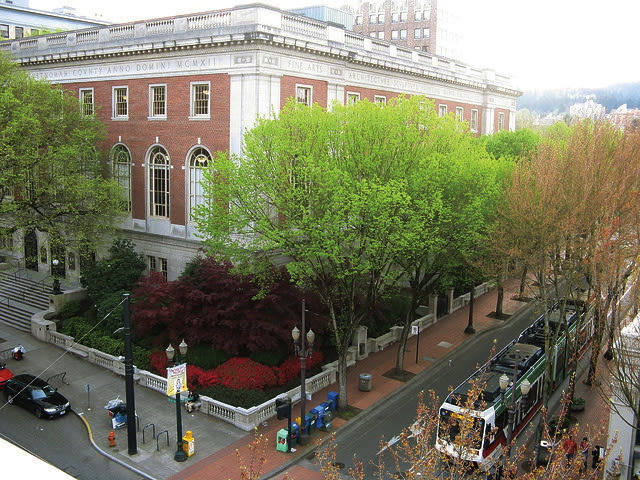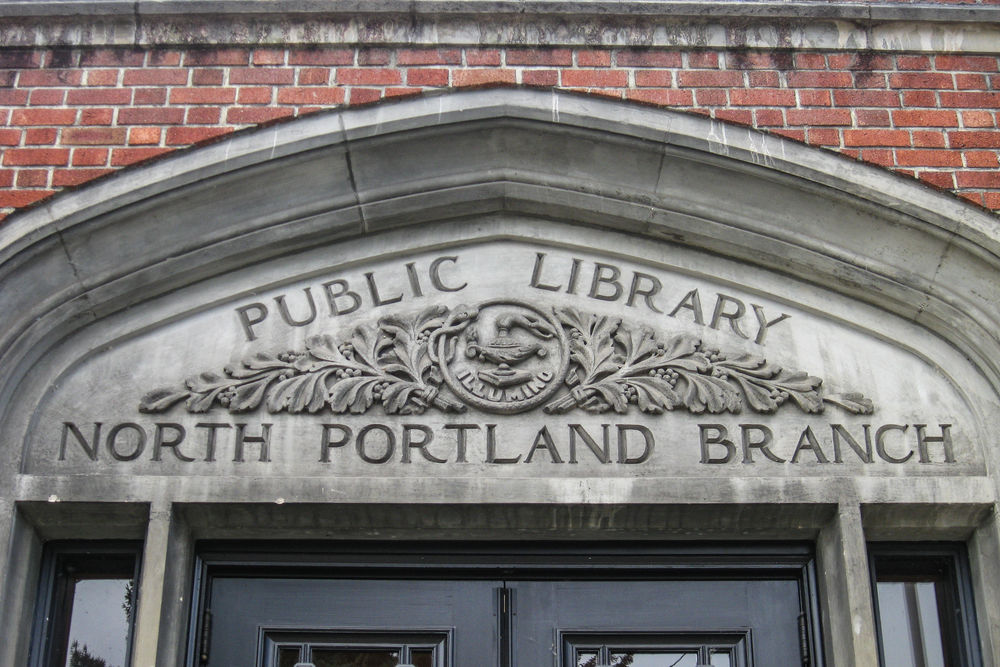As COVID Case Numbers Drop in Portland, Local Libraries Plan for Reopening

Central Library, like other branches in the Multnomah County Library system, has been closed for almost a year. As COVID case numbers drop, plans are underway for a phased reopening.
Image: Courtesy Paul Lowry
As COVID-19 case counts drop in Multnomah County, restaurants, bars, and gyms are starting to reopen for indoor services. Schools, too. Even outdoor swimming pools will offer limited hours come next summer.
Next up: the county’s vaunted library system. While the library system has been doing a brisk trade in e-books and virtual education offerings since the start of the pandemic, its brick-and-mortar buildings have been closed to the public for nearly a year (except for holds pickup).
Though there is no confirmed date for a reopening, plans call for starting with five branches, chosen because they are close to historically underserved communities, says deputy library director Terrilyn Chun. The five branches are Capitol Hill in Southwest Portland, Gresham in eastern Multnomah County, Holgate and Midland in Southeast Portland, and the Kenton in North Portland.
Multnomah County Commission Chair Deborah Kafoury needs to sign off on any reopening plans, says Shawn Cunningham, a spokesperson for the library system. Kafoury is meeting in the next week or so with library officials to discuss timelines, Cunningham says.
After those branches reopen for limited service, Chun says, the landmark Central Library is next, though that comes with its own set of challenges. The building is a linchpin of downtown Portland, and its reopening could be a shot in the arm to the city’s on-its-heels core. But its three main floors and many nooks and crannies make monitoring social distancing to keep staff and patrons safe a challenge, Chun says.
In the meantime, the five branches that will be first to reopen will focus on key services, determined after extensive community outreach, says library manager Perry Gardner, who led a team working on the plan. Residents asked for technology access, study spaces, reference assistance, and limited browsing.
Access to technology is especially important in underserved communities but presents its own challenges. For safety reasons, Chun says, the library wants to space computers 10 feet apart from each other. Setting up branches, especially smaller ones, for physical distancing isn’t simple. (You try moving book-laden shelves that have been bolted to the ground, for example, to make one-way paths for people to be able to move freely.)
Logistics, such as how many people can be in each branch at once, will vary by location, Chun says, and it’s not yet clear whether you’ll have to make an appointment beforehand or just wait on line if the facility is at capacity.
Across the country, libraries have reopened in many places, though with limited hours and services, and rules about capacity. For example, in San Diego, libraries are open for computer and printing use, book pickups, and librarian assistance; the Chicago Public Library is also open for limited services. Elsewhere, libraries remain closed, as in San Francisco, although a few branches there have been repurposed as “community learning hubs,” offering in-person academic support for kids while schools are shut.
Since the pandemic shutdowns, the library management’s relationship with its librarians and support staff has had its ups and downs. Library managers announced layoffs on July 7, then said they could be avoided via voluntary retirements/layoffs, temporary reassignments to other jobs within Multnomah County, and leaving vacant positions unfilled. Staffers, who are members of the American Federation of State, County and Municipal Employees union, say that cuts were achieved through reduced hours and demotions that will take a toll on library services.
Still, at least one library employee—a bilingual Chinese library clerk at the Midland branch who goes by Miss Glendy—says she’s looking forward to her building reopening at limited capacity, and feeling confident that she and her coworkers will have the personal protective equipment they need and that their building’s ventilation system will be up to date.
That's a big difference from local schools, another education-based institution that has yet to broadly reopen in the county, though some districts, including Portland Public Schools, are aiming for kids to return to classrooms in early April. In most districts, teachers and support staff are still negotiating with administrators over safety conditions around returning to work, with ventilation emerging as a big sticking point. But libraries are planning a phased reopening, meaning employees will return in waves, not all at once. Another difference: unlike educators and school support staff, library staffers are not in a priority group for vaccination, though individual staffers may qualify.
"As the library begins to restore indoor access for the public, staff members at the designated locations will be asked to resume those services," Cunningham wrote in an email to Portland Monthly, referring to services like reference assistance, technology access, and managing study spaces and browsing. "If staffing levels are below required levels due to individual employees' personal circumstances or for other reasons, the library will fill those roles according to the labor agreement between Multnomah County and AFSCME Local 88."
Currently, all Multnomah County library branches are open for curbside pickup of online holds. After the first group of five libraries and the downtown branch reopen, Chun says the next branches to open are likely to be concentrated in East Portland and the eastern Multnomah County suburbs, continuing the focus in areas where residents are less likely to have reliable access to technology at home.




